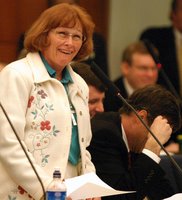Freshman delegate finds her way in Richmond
 By Annie McCallum
By Annie McCallumCapital News Service
RICHMOND -- Delegate Anne Crockett-Stark, R-Wytheville, came to Richmond to give Southwest Virginia a voice during the legislative session. Southwest Virginia is far from the Commonwealth's capital, but this freshman delegate is up to the job.
Crockett-Stark is sponsoring nine bills. But her toughest battle this session hasn't been battling bills; it's been learning the lay of the land.
"My toughest personal battle has been learning just how the process works," Crockett-Stark said, adding that things move quickly. "I'm finding with almost 4,000 bills, there's very little time."
The fast-paced nature of the Legislature and the last-minute changes made to bills are a major concern for Crockett-Stark. She said sometimes amendments are made, and she worries people at home will question why she voted for something.
"With amendments and substitutes, you need to be really careful on how you vote because sometimes it changes the code," Crockett-Stark said.
True testaments to the complexities of bills are the thick black books that line the bookshelf behind her desk. They're codebooks, and she says it's not unusual for her to be up late reading and rereading. She said she wants to be certain she understands everything.
More than halfway through the session, Crockett-Stark has a handle on things. Five of her nine bills have survived crossover. Crossover, which was Feb. 14, marks the middle of the session and the deadline for bills to receive approval from at least one chamber of the General Assembly.
Since then, several of Crockett-Stark's bills have cleared both houses.
House Bill 439 passed through the House nearly unanimously. Delegate Clarke N. Hogan, R-South Boston, voted against the measure. Crockett-Stark, who sits next to Hogan in House Chambers, said it was just a joke.
"He was just teasing me and he didn't change it in time," she said.
Joking aside, Crockett-Stark believes the bill is extremely important for the people in her area. The bill aims at getting Virginia representation on the governing board of a sewage treatment plant located in both Virginia and West Virginia.
The plant serves both the city of Bluefield, West Virginia and the town of Bluefield, Virginia. Currently, the governing board only has representation from West Virginia. Crockett-Stark's bill wants equal representation from both states.
She said the elimination of Virginia representation from the board several years ago "has caused unrest because it's taxation without representation; our people are paying for those services."
As the bill makes its way through the Legislature, private negotiations to resolve the issue are also underway. An amendment to the bill even gives private negotiations until Jan. 1, 2007, to come to an agreement. Crockett-Stark explained the bill is insurance.
"I feel the bill needs to stay in place if negotiating falls through," she said.
Other proposals on the top of Crockett-Stark's legislative agenda include changing the name of the Domestic Violence Victim Fund and a budget amendment that will help fund a workforce center in Pulaski.
House Bill 1409 would change the Domestic Violence Victim Fund to the Sexual and Domestic Violence Victim Fund.
"My feelings were many times if there is domestic violence there is sexual abuse, sexual violence," Crockett-Stark said.
Criminals convicted of sexual or domestic violence are required to pay a fee. The money is then given to the fund to help victims.
"It's one way to help victims without the state paying for it," Crockett-Stark said.
The bill has cleared both houses and awaits action by the governor to become law.
The fate of Crockett-Stark's proposed budget amendment is somewhat more uncertain. The goal of the proposed budget amendment is to get funding for a workforce center that would be a major source of economic development in Pulaski.
The center would be public private partnership between New River Community College and Volvo. New River Community College would own the building and lease the land, but Volvo would furnish machines and train workers.
"I want this so bad for further economic development in counties," Crockett-Stark said, acknowledging its expense. "It's got a $5 million price tag on it."
Crockett-Stark said she hopes the workforce center would bring even more opportunity to the area and provide jobs in several counties.

0 Comments:
Post a Comment
<< Home